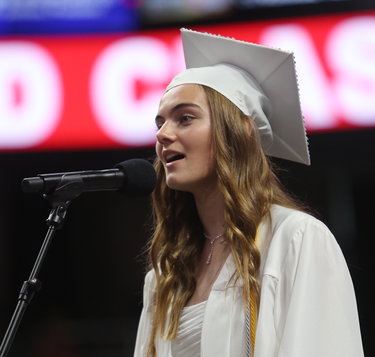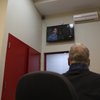Super says music a ‘top priority’ as GCSD readies spaces for the future
GUILDERLAND — The school district here is looking ahead 20 years in planning a series of capital projects to update learning spaces. The first one is expected to be a year from now, said Superintendent Marie Wiles.
“We hear you loud and clear,” Wiles told the president and vice president of the Guilderland Music Parents and Friends Association who addressed the school board on May 7.
“It is crystal clear to all of us that the performing arts is a top priority,” said Wiles. “So don’t worry.”
Julie Petti, the association’s president, noted that last September, Guilderland High School students had spoken to the board and presented a petition with hundreds of signatures attesting to the impact cramped quarters were having on their education.
“We are concerned that our message, which was supported by the board, has turned into a task force to look at all district spaces …,” said Petti. “We are concerned that the music department’s voice will be lost among the many areas vying for resources.”
She described Guilderland’s music facilities as “among the worst in the area” while also going over a long list of state and national accolades garnered by the music program as well as by individual students.
“Significant changes are needed,” Petti concluded. “We think our children deserve better and we ask that you continue to keep this need as a high priority.”
Erin Yerdon, the association’s vice president, echoed those concerns.
She said over 2,000 Guilderland students participate in music programs, which are curricular, as opposed to after-school, activities.
“These are students that are participating in something that is as essential as math, science, social studies, or language arts,” said Yerdon. “Yet our facilities are subpar, to say the least. Our auditorium is the smallest in the Suburban Council. We do not have a band room or other practice rooms, and they are not equipped with proper acoustic space or storage.”
Over the weekend, Yerdon said, she was at a New York State School Music Association festival where she talked to teachers from North Colonie, which has a capital project on the ballot in May.
The project includes renovating its auditorium, the second smallest in the Suburban Council, Yerdon said. The proposal is to add a balcony with 350 seats and update music classrooms and practice areas.
Yerdon said the teacher looked confused when she asked if North Colonie students and parents had spoken to the school board or petitioned the district.
“How did you make it happen?” asked Yerdon.
“They just knew we needed it,” replied the North Colonie teacher.
“Our students and their music programs proudly represent our district,” Yerdon concluded. “What are you doing for these students and for the amazing teachers that teach without classrooms and facilities they so desperately need?
Future-Ready Task Force
The Future-Ready Task Force, which formed last winter with over 50 volunteers is divided into five working subcommittees dealing with: elementary programs; science, technology, engineering, math and career skills; secondary humanities; gathering spaces; and performing arts.
“They have been doing tours of our own facilities to understand exactly what we’re working with,” Wiles told the school board at the May 7 meeting. “They’ve been traveling to neighboring school districts to see what’s possible.”
Representatives from CSArch, the district’s architectural firm, “have been coming to our meetings and giving us guidance and advice on how to proceed with this work,” said Wiles.
A ThoughtExchange, an online survey, was launched last week, Wiles said, to gather views from faculty, teaching assistants, aids, and monitors. There were 220 participants.
Wiles read a statement of the survey results that was generated by artificial intelligence: “The responses indicate a strong desire for updated, clean and esthetically pleasing facilities that are safe and have good temperature control and lighting.
“Flexible seating options and updated classrooms with functional furniture also highlighted specialized environments for special education classes and spaces for collaboration and independent work are deemed necessary but need for technology that is compatible with operating systems and thoughtfully placed within classrooms as emphasized.
“Respondents also called for more visually appealing shared areas, comfortable seating spots and adequate staffing to meet individual and student needs. They suggest that the cafeteria should be updated to promote a sense of community.”
The performing arts subcommittee did its own survey, Wiles said, including staff, students, and parents.
“The hope is to have the groups be ready to make some recommendations to the board in the very early fall,” she said, with a proposition before the voters next May.
The board’s vice president, Blanca Gonzalez-Parker, who ran the meeting in the absence of its president, asked if the board or the facilities committee would decide how to prioritize.
“It will build like a pyramid,” said Wiles. “But ultimately what goes on a referendum in May of 2025 is the board’s decision.”
She also said, “Everyone knows that the performing arts for music is a top priority, so people shouldn’t worry that that’s going to get lost in other programs.”
Wiles reiterated that a series of capital projects will come before voters in the decades ahead.
“So between now and 2044, which is a scary way to put it …,” Wiles said, “what are the four or five or six capital projects that we need to do to transform our learning spaces?”



